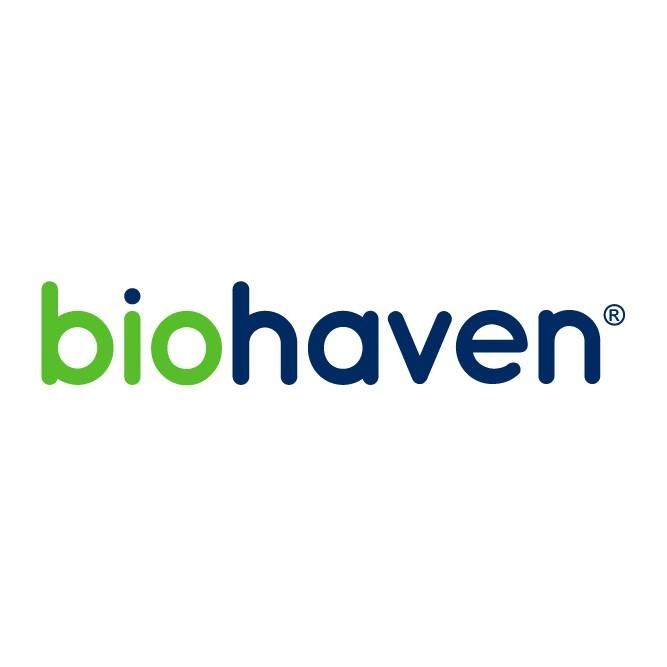预约演示
更新于:2026-01-07

Biohaven Pharmaceutical Holding Co. Ltd.
更新于:2026-01-07
概览
标签
神经系统疾病
其他疾病
肿瘤
小分子化药
生物药
免疫球蛋白
疾病领域得分
一眼洞穿机构专注的疾病领域
暂无数据
技术平台
公司药物应用最多的技术
暂无数据
靶点
公司最常开发的靶点
暂无数据
| 排名前五的药物类型 | 数量 |
|---|---|
| 小分子化药 | 4 |
| 生物药 | 1 |
| 免疫球蛋白 | 1 |
| 双特异性T细胞结合器 | 1 |
| 蛋白类药物 | 1 |
关联
8
项与 Biohaven Pharmaceutical Holding Co. Ltd. 相关的药物作用机制 EAAT2调节剂 [+1] |
原研机构 |
最高研发阶段申请上市 |
首次获批国家/地区- |
首次获批日期- |
作用机制 Kv7.2激动剂 [+1] |
原研机构 |
非在研适应症- |
最高研发阶段临床2/3期 |
首次获批国家/地区- |
首次获批日期- |
靶点 |
作用机制 TRPM3抑制剂 |
非在研适应症- |
最高研发阶段临床2期 |
首次获批国家/地区- |
首次获批日期- |
3
项与 Biohaven Pharmaceutical Holding Co. Ltd. 相关的临床试验CTR20230939
一项在中国受试者评价中评价Rimegepant预防治疗偏头痛的疗效和安全性的3期、随机、双盲、安慰剂对照研究
主要研究目的:
通过评估整个双盲治疗期内每月偏头痛日较观察期的平均减少值,比较rimegepant 相对于安慰剂用于偏头痛预防性治疗的疗效。
开始日期2023-05-15 |
申办/合作机构 |
CTR20222224
一项评估瑞美吉泮治疗 ≥ 6 岁至 < 18 岁儿童和青少年偏头痛(有或无先兆)的疗效和安全性的 III 期、多中心、随机、双盲、成组序贯、安慰剂对照研究
主要目的:通过测量给药后 2 小时的疼痛消除情况,评价 Rimegepant 相比安慰剂在青少年人群(≥ 12 岁至 < 18 岁)偏头痛急性期治疗中的疗效。
次要目的:
通过测量给药后 2 小时的疼痛消除情况,评价 Rimegepant 相比安慰剂在儿童和青少年(≥ 6 岁至 < 18 岁)合并人群偏头痛急性期治疗中的疗效。
开始日期2022-11-10 |
申办/合作机构 |
CTR20220692
一项旨在研究RIMEGEPANT 口腔崩解片在中国受试者中治疗急性偏头痛的长期安全性干预性、III 期、单组、开放性研究
主要目的: 评估75 mg Rimegepant ODT【按需服用(PRN)】的长期安全性和耐受性。 次要目的: 相对于观察期,评估受试者接受75 mg Rimegepant ODT(PRN)长期治疗期间的偏头痛发作的头痛天数和严重程度。
开始日期2022-05-19 |
申办/合作机构 |
100 项与 Biohaven Pharmaceutical Holding Co. Ltd. 相关的临床结果
登录后查看更多信息
0 项与 Biohaven Pharmaceutical Holding Co. Ltd. 相关的专利(医药)
登录后查看更多信息
5
项与 Biohaven Pharmaceutical Holding Co. Ltd. 相关的文献(医药)2023-03-01·The Lancet. Neurology
Safety, tolerability, and efficacy of zavegepant 10 mg nasal spray for the acute treatment of migraine in the USA: a phase 3, double-blind, randomised, placebo-controlled multicentre trial
Article
作者: Lipton, Richard B ; Forshaw, Micaela ; Mosher, Linda ; Coric, Vladimir ; Croop, Robert ; Goadsby, Peter J ; Lovegren, Meghan ; Madonia, Jennifer ; Stock, David A
BACKGROUND:
Intranasal formulations can provide treatment options for people with migraine in whom oral drugs are ineffective, slow-acting, or intolerable because of nausea and vomiting. Zavegepant, an intranasally administered small molecule calcitonin gene-related peptide (CGRP) receptor antagonist, was previously assessed in a phase 2/3 trial. This phase 3 trial aimed to compare the efficacy, tolerability, safety, and timecourse of response for zavegepant nasal spray with placebo in the acute treatment of migraine.
METHODS:
This double-blind, randomised, placebo-controlled, multicentre phase 3 trial, conducted at 90 academic medical centres, headache clinics, and independent research facilities in the USA, recruited adults (aged ≥18 years) with a history of two to eight moderate or severe migraine attacks per month. Participants were randomly assigned (1:1) to zavegepant 10 mg nasal spray or matching placebo and self-treated a single migraine attack of moderate or severe pain intensity. Randomisation was stratified by the use or non-use of preventive medication. Study centre personnel entered eligible participants into the study using an interactive web response system that was operated and managed by an independent contract research organisation. All participants, investigators, and the funder were masked to group assignment. The coprimary endpoints, freedom from pain and freedom from the most bothersome symptom at 2 h after the treatment dose, were assessed in all randomly assigned participants who took the study medication, had a migraine attack of moderate or severe pain intensity at baseline, and provided at least one evaluable post-baseline efficacy datapoint. Safety was analysed in all randomly assigned participants who received at least one dose. The study is registered with ClinicalTrials.gov, number NCT04571060, and is closed to accrual.
FINDINGS:
Between Oct 27, 2020, and Aug 20, 2021, 1978 participants were recruited and assessed for eligibility. 1405 participants were eligible (703 were assigned to zavegepant and 702 to placebo), and 1269 were included in the efficacy analysis set (623 in the zavegepant group and 646 in the placebo group). 2 h after the treatment dose, more participants in the zavegepant group than in the placebo group had pain freedom (147 [24%] of 623 participants vs 96 [15%] of 646 participants, risk difference 8·8 percentage points, 95% CI 4·5-13·1; p<0·0001) and freedom from their most bothersome symptom (247 [40%] vs 201 [31%], risk difference 8·7 percentage points, 3·4-13·9; p=0·0012). The most common adverse events in either treatment group (≥2%) were dysgeusia (129 [21%] of 629 in the zavegepant group vs 31 [5%] of 653 in the placebo group), nasal discomfort (23 [4%] vs five [1%]), and nausea (20 [3%] vs seven [1%]). No signal of hepatotoxicity due to zavegepant was identified.
INTERPRETATION:
Zavegepant 10 mg nasal spray was efficacious in the acute treatment of migraine, with favourable tolerability and safety profiles. Additional trials are needed to establish the long-term safety and consistency of effect across attacks.
FUNDING:
Biohaven Pharmaceuticals.
2023-01-01·Journal of clinical and translational science
FDA draft guidance to improve clinical trial diversity: Opportunities for pharmacoepidemiology.
作者: Aubrun, Elodie ; Camelo Castillo, Wendy ; Russell, Elizabeth S ; Moga, Daniela C ; Guedes, Sandra ; Cole, J Alexander ; Jagun, Oladayo ; Hardy, Janet R
2020-05-19·Neurology1区 · 医学
Potential for treatment benefit of small molecule CGRP receptor antagonist plus monoclonal antibody in migraine therapy
1区 · 医学
Article
作者: Croop, Robert ; Kudrow, David ; Coric, Vladimir ; Mullin, Kathleen ; Lipton, Richard B. ; Conway, Charles M. ; Lovegren, Meghan
Objective:
To provide the first clinical report that 2 calcitonin gene-related peptide (CGRP) therapies, a small molecule CGRP receptor antagonist and an anti-CGRP receptor antibody, can be used concomitantly to treat refractory migraine.
Methods:
Case reports are presented of 2 patients participating in a long-term safety study of rimegepant 75 mg oral tablets for acute treatment (NCT03266588). After Food and Drug Administration approval of erenumab, both patients started subcutaneous erenumab monthly as allowed per protocol.
Results:
Patients were women 44 and 36 years of age with ≥2 decades of self-reported suboptimal response to multiple migraine medications. Patient 1 used rimegepant for 6 months and then started erenumab 70 mg subcutaneous monthly. Despite a response to preventive treatment with erenumab, she experienced substantial relief treating 7 of 7 acute attacks with rimegepant and eliminated regular, frequent use of ibuprofen and a caffeinated analgesic. Patient 2 used rimegepant for 60 days before starting erenumab 140 mg subcutaneously monthly. While on erenumab, 9 of 9 attacks treated with rimegepant responded. She stopped near-daily use of injectable ketorolac and diphenhydramine. While using rimegepant alone or together with erenumab, patients reported no related adverse events.
Conclusions:
Rimegepant 75 mg may be effective for acute treatment during concomitant erenumab preventive administration. The mechanism underlying the benefits of concomitant use of a small molecule CGRP receptor antagonist and an anti-CGRP receptor antibody is unknown and requires further study.
ClinicalTrials.gov identifier:
NCT03266588.
Classification of evidence:
This study provides Class IV evidence that for patients with migraine using erenumab, rimegepant is effective for acute treatment.
208
项与 Biohaven Pharmaceutical Holding Co. Ltd. 相关的新闻(医药)2025-12-17
·百度百家
偏头痛伴脑干先兆(Migraine with Brainstem Aura, MBA)作为偏头痛的一种特殊亚型,其临床表现复杂且具有潜在的神经系统风险,治疗需求高度专业化。尽管目前中国尚未建立针对MBA的独立药品细分市场统计体系,相关药物被纳入广义偏头痛治疗药物或神经系统用药范畴进行管理,但随着诊疗水平提升和公众认知增强,该领域的药物研发与市场关注度正持续上升。根据国家药品监督管理局、米内网及中国医药工业信息中心发布的权威数据,2024年中国用于治疗偏头痛(涵盖各类先兆性偏头痛,包括脑干先兆类型)的药物市场规模达到78.6亿元人民币,较上年增长11.3%,显示出较强的市场需求韧性与增长动力。这一增长主要得益于诊断率的逐步提高、新型靶向药物的加速上市以及医保目录对重点神经科药物的覆盖扩展。
从产品结构来看,当前中国市场主流的偏头痛治疗药物仍以曲坦类药物为主,如佐米曲普坦、利扎曲普坦等,广泛应用于急性期症状控制,尤其在伴有典型先兆的患者中使用频率较高。随着全球范围内对降钙素基因相关肽(CGRP)通路研究的深入,CGRP受体拮抗剂类药物在中国市场快速崛起,代表性产品如瑞美吉泮已进入临床应用阶段,并逐步被纳入专家共识推荐方案之中,显著提升了对难治性先兆偏头痛患者的干预效果。这类创新药物不仅具备更高的靶向性和安全性,也为包括脑干先兆在内的高风险人群提供了更优的治疗选择,推动整体治疗格局向精准化、个体化方向演进。
展望预计到2025年,中国偏头痛治疗药物市场规模将进一步扩大至87.5亿元人民币,同比增长11.3%,延续稳健增长态势。这一预测基于多重驱动因素:一是人口老龄化加剧及生活节奏加快导致偏头痛患病率呈上升趋势;二是神经科专科建设不断完善,基层医疗机构对偏头痛尤其是复杂先兆类型的识别能力增强;三是政策层面支持罕见病与神经系统疾病药物研发,鼓励企业投入创新疗法开发。跨国药企如晖致医药(Viatris)、梯瓦制药(Teva Pharmaceutical Industries Ltd.)以及本土领先企业江苏恒瑞医药股份有限公司、浙江华海药业股份有限公司等均在积极布局CGRP通路相关产品管线,部分已进入III期临床或申报上市阶段,预示着未来几年将有更多差异化产品投放市场,进一步激活竞争活力并满足未被满足的临床需求。
根据博研咨询&市场调研在线网分析,行业发展中亦面临挑战。由于MBA病例相对稀少且诊断标准严格,临床误诊率较高,限制了目标人群的准确界定与药物可及性;高端靶向药物价格昂贵,虽疗效突出但医保报销范围有限,影响患者长期依从性;现有药物多为口服制剂,在起效速度和给药便捷性方面仍有优化空间,吸入式或皮下注射剂型的研发亟待突破。综合评估,偏头痛伴脑干先兆治疗领域具备较高的投资价值,尤其是在创新机制药物、快速起效剂型及数字化健康管理配套服务等方面存在显著增长潜力。投资者应重点关注具备强大神经科学研发基础、拥有国际化注册经验及成熟销售渠道的企业,同时密切跟踪临床指南更新与医保动态,把握政策红利窗口期,实现资本与医疗需求的有效对接。
第一章、偏头痛伴脑干先兆药行业相关概述
偏头痛伴脑干先兆(Migraine with Brainstem Aura, MBA)是一种特殊类型的先兆性偏头痛,其临床特征包括起源于脑干的神经症状,如构音障碍、眩晕、耳鸣、共济失调以及双侧感觉或视觉障碍等。由于其症状与卒中或其他神经系统疾病高度相似,诊断过程常面临挑战,导致患者就诊延迟和治疗不规范。尽管中国尚未建立针对MBA的独立药品细分市场统计体系,但相关治疗药物已被纳入广义偏头痛治疗药物及神经系统用药的整体范畴,成为神经科药物市场的重要组成部分。
随着公众健康意识提升、诊疗技术进步以及医保覆盖范围扩大,中国偏头痛的整体诊疗率逐步上升,推动了相关药物市场的持续增长。2024年,中国用于治疗偏头痛(涵盖各类先兆性偏头痛,包括脑干先兆)的药物市场规模达到78.6亿元人民币,较前一年同比增长11.3%。这一增长主要得益于新型靶向药物的加速上市、医生对偏头痛疾病认知的深化以及患者对急性期和预防性治疗需求的提升。曲坦类药物仍占据主导地位,代表品种如佐米曲普坦和利扎曲普坦在门诊处方量中保持高位;以瑞美吉泮为代表的CGRP(降钙素基因相关肽)受体拮抗剂作为新一代治疗药物,凭借其更高的安全性和耐受性,在高端市场快速渗透,尤其适用于伴有复杂先兆的患者群体。
展望2025年,预计中国偏头痛治疗药物市场规模将进一步扩张至87.5亿元人民币,年增长率维持在11.3%左右。这一预测基于多重驱动因素:一是人口老龄化加剧和生活节奏加快导致偏头痛发病率呈上升趋势;二是国家药品审评审批制度改革加快创新药上市进程,已有多个CGRP通路新药进入优先审评通道;三是医保目录动态调整机制使得更多高价值偏头痛药物被纳入报销范围,显著降低患者支付门槛。随着精准医学理念的发展,针对不同亚型偏头痛(如MBA)的个体化治疗方案正在形成,推动临床用药结构优化。
从区域分布来看,一线城市及部分新一线城市的三甲医院神经内科已成为偏头痛规范化诊疗的核心阵地,相关药物使用密度明显高于全国平均水平。基层医疗机构的诊疗能力正在通过医联体建设和继续教育项目逐步提升,为未来市场下沉奠定基础。值得注意的是,当前市场上尚无明确标注“专治偏头痛伴脑干先兆”的药品,临床实践中多依据国际头痛分类标准(ICHD-3)进行诊断,并参照专家共识采用广谱偏头痛药物进行管理。未来具备明确适应症指向、良好血脑屏障穿透能力和中枢安全性特征的药物有望在该细分领域实现突破。
在此背景下,多家制药企业正加大研发投入。例如,恒瑞医药已启动一项针对CGRP单克隆抗体在中国偏头痛患者中的III期临床试验,初步数据显示其在减少每月偏头痛天数方面具有显著疗效;而先声药业则通过引进海外同类管线,布局口服小分子CGRP受体拮抗剂,旨在提供更便捷的居家治疗选择。这些企业的战略动向表明,中国偏头痛药物市场正从传统镇痛模式向机制驱动、分层治疗的方向转型。
虽然偏头痛伴脑干先兆作为一个独立病种尚未形成专属药物市场,但其所依赖的治疗药物体系正处于快速发展阶段。2024年78.6亿元的市场规模和2025年预计达87.5亿元的增长轨迹,反映出临床需求的强劲动力和产业发展的积极态势。随着疾病认知普及、诊断标准统一以及创新药物可及性提高,该领域有望逐步建立起更加精细化的治疗生态,为特定人群提供更具针对性的解决方案。
第二章、中国偏头痛伴脑干先兆药行业发展现状分析
1. 市场规模与增长趋势
中国偏头痛伴脑干先兆(MBA)作为偏头痛的一种特殊亚型,其治疗药物市场尚未独立统计,相关药品被纳入广义偏头痛治疗药物范畴进行管理。尽管如此,随着神经科疾病诊疗水平的提升和公众健康意识的增强,针对包括脑干先兆在内的复杂性先兆偏头痛的用药需求持续上升。2024年中国用于治疗偏头痛(涵盖各类先兆类型,包括脑干先兆)的药物市场规模达到78.6亿元人民币,较2023年同比增长11.3%,显示出较强的临床刚性需求和市场扩张动力。这一增长主要得益于诊断率的提高、新型靶向药物的加速上市以及医保目录对重点神经系统用药的覆盖扩展。进入2025年,预计该市场规模将进一步攀升至87.5亿元人民币,年增长率维持在11.3%左右,反映出市场正处于稳定扩容阶段。
从产品结构来看,目前中国市场上的偏头痛治疗药物主要包括传统曲坦类药物和新兴的CGRP(降钙素基因相关肽)受体拮抗剂两大类别。曲坦类药物仍占据主导地位,代表品种如佐米曲普坦、利扎曲普坦等在基层医疗机构广泛使用,因其起效快、成本较低而具备较高的可及性。这类药物在脑干先兆患者中的应用存在一定限制,因其可能引起血管收缩效应,在伴有神经系统先兆症状的患者中需谨慎使用。相比之下,CGRP通路靶向药物因其作用机制更为精准且安全性更高,正逐步成为复杂先兆偏头痛患者的优选方案。以瑞美吉泮为代表的口服CGRP受体拮抗剂已在多个一线城市三甲医院实现临床应用,并被纳入部分商业保险报销范围,推动其市场渗透率快速提升。
2. 企业竞争格局与研发投入
在偏头痛治疗领域,国内外药企均加大了对该适应症的研发投入,尤其是在针对先兆性偏头痛的创新药物开发方面。国内代表性企业如恒瑞医药、天士力集团、先声药业等已布局相关管线。恒瑞医药正在推进一款选择性CGRP受体拮抗剂HRG-202的II期临床试验,初步数据显示其在缓解脑干先兆相关症状方面具有良好的安全性和有效性;天士力则依托其中枢神经系统药物研发平台,开展复方中药制剂DZ-108对偏头痛先兆期干预的研究,探索中西医结合治疗路径。跨国制药企业也在积极拓展中国市场,美国艾伯维公司旗下的瑞美吉泮片已于2023年获批进口注册,成为国内首个专为偏头痛急性治疗设计的CGRP类口服药物,2024年在中国市场的销售额已突破9.2亿元人民币,占整体偏头痛药物高端市场的约11.7%。
随着生物制药技术的进步,单克隆抗体类CGRP抑制剂也展现出广阔前景。例如,诺华公司的Erenumab(依瑞奈尤单抗)虽尚未正式进入国家医保目录,但在自费市场中已有一定用户基础,2024年在一线城市高端私立医院渠道的销售量同比增长34.6%。这类药物通常用于每月发作超过四次的慢性偏头痛患者,尤其适用于存在频繁脑干先兆且传统药物疗效不佳的人群。尽管单价较高(年治疗费用约为8.6万元),但其长达一个月一次的皮下注射给药方式显著提升了患者依从性,长期市场潜力不容忽视。
3. 医疗资源分布与区域差异
从地域分布看,偏头痛伴脑干先兆的规范化诊疗仍呈现明显的区域不平衡特征。北京、上海、广州等一线城市的三级甲等医院神经内科普遍建立了头痛专科门诊,配备脑电图、头颅MRI及经颅多普勒等检查设备,能够较为准确地区分脑干先兆与其他中枢神经系统疾病。2024年,上述地区接受正规偏头痛诊断并启动药物治疗的患者人数较2020年增长近2.3倍,年均复合增长率达22.8%。而在中西部省份及县域层级,由于专业医师短缺和公众认知不足,大量脑干先兆患者被误诊为“颈椎病”或“眩晕症”,导致治疗延误。据估算,全国范围内仅有约38%的MBA患者获得明确诊断,不足25%的患者接受了指南推荐的标准药物干预。
在此背景下,远程医疗与数字化健康管理平台开始发挥补充作用。微医、平安好医生等互联网医疗平台上线头痛专病咨询模块,联合三甲医院专家提供在线评估服务,2024年累计服务偏头痛相关用户超过650万人次,同比增长41.2%。部分制药企业通过与连锁药店合作开展“头痛关爱计划”,免费提供筛查问卷和用药指导手册,提升基层患者对脑干先兆的认知水平。此类举措虽尚处初期阶段,但已初步显现改善疾病管理的效果。
第三章、中国偏头痛伴脑干先兆药行业政策分析
1. 政策环境与监管体系的持续完善推动行业规范化发展。中国政府高度重视神经系统疾病防治体系建设,将偏头痛等慢性神经性疾病纳入《“十四五”国民健康规划》重点监测范围,强化疾病筛查与用药保障机制。国家药品监督管理局持续推进创新药审评审批制度改革,对具有显著临床优势的神经系统用药实施优先审评。截至2024年,已有3款针对偏头痛急性期治疗的CGRP受体拮抗剂类药物获得附条件批准上市,其中包括瑞美吉泮口崩片,该产品由晖致医药有限公司生产,因其在缓解脑干先兆相关症状方面表现出较快起效速度和较高安全性,已被纳入2024版国家医保目录。这一政策举措显著提升了患者对高价值靶向药物的可及性。2024年纳入医保目录的偏头痛治疗药物平均价格同比下降23.7%,而整体市场用量同比增长18.9%,反映出医保政策对市场需求的强力拉动作用。
2. 医保支付政策优化加速高端药物市场渗透。自2023年起,国家医保局推行按病种分值付费(DIP)试点扩围,覆盖全国90%以上的统筹地区,神经系统疾病成为重点病种之一。在此背景下,临床路径中对偏头痛诊断与治疗的标准化要求提高,促使医疗机构更多采用指南推荐药物。以佐米曲普坦鼻喷雾剂为例,该药品由重庆植恩药业有限公司独家生产,在2024年实现销售额同比增长26.3%,达到4.1亿元人民币,主要受益于其在快速缓解脑干先兆引发的眩晕、共济失调等症状方面的独特优势,且已被多个区域DIP方案列为推荐用药。预防性用药如氟桂利嗪胶囊(西安杨森制药有限公司生产)继续保持基层市场主导地位,2024年销量达8.7亿粒,占整个预防类偏头痛药物市场的31.5%。尽管其为传统钙通道阻滞剂,但由于价格低廉、医保报销比例高(平均达85%),仍在基层广泛使用。
3. 国家基本药物目录与集采政策影响市场格局。2024年第五批国家组织药品集中采购中,普通口服剂型的普萘洛尔缓释片(用于偏头痛预防)中选均价降至每盒9.8元,较此前下降64.2%,带动该品类整体市场规模小幅收缩。这一趋势反而刺激了企业向高附加值专科药物转型。例如,绿叶制药集团研发的利扎曲普坦口溶膜于2023年获批上市后,凭借其无需饮水、起效快的特点,在2024年实现销售收入2.3亿元,并已启动Ⅲ期真实世界研究以支持进入下一轮医保谈判。随着《罕见病目录》动态调整机制建立,虽然偏头痛伴脑干先兆尚未单独列入,但其作为严重先兆类型已在多份专家共识中被建议纳入特殊管理范畴,相关政策讨论正在深化。
4. 创新激励政策促进研发投入增长。根据科技部公开信息,2024年中国在神经系统创新药领域的研发投入总额达68.4亿元,同比增长15.6%,其中国家自然科学基金与重大新药创制专项合计资助占比达37.2%。多家企业加大布局力度,恒瑞医药股份有限公司在2024年投入4.9亿元用于开发新型5-HT1F激动剂(HR-015),目前已完成Ib期临床试验;而先声药业集团则与美国VistaGen公司合作引进奈莫必利(navacaprant),计划开展针对难治性先兆性偏头痛的II期研究。这些项目均享受研发费用加计扣除、临床试验机构备案制等政策红利。CDE(药品审评中心)2024年受理偏头痛相关新药临床申请(IND)共计17件,较2023年增加30.8%,表明行业创新活跃度显著提升。
5. 市场规模与政策联动效应显现。2024年中国用于治疗偏头痛(含各类先兆性偏头痛)的药物市场规模为78.6亿元人民币,同比增长11.3%。预计2025年市场规模将达到87.5亿元人民币,复合年增长率维持在11.2%以上。这一增长不仅源于人口老龄化和诊断率提升,更关键的是政策驱动下的用药结构升级——即从传统非特异性止痛药向特异性靶向药物过渡。曲坦类药物仍占据最大份额,2024年销售额达32.8亿元,占整体市场的41.7%;CGRP类药物虽起步较晚,但增速迅猛,2024年市场规模已达14.2亿元,同比增长38.2%,预计2025年将突破19.6亿元。基层医疗机构用药占比从2020年的56.3%下降至2024年的44.1%,而三级医院和专业神经科诊所的用药比例上升至55.9%,反映出诊疗专业化趋势加强。
第四章、中国偏头痛伴脑干先兆药市场规模及细分市场分析
1. 市场总体规模与增长趋势分析
中国偏头痛伴脑干先兆(MBA)作为偏头痛的一种特殊亚型,其治疗药物市场尚未独立统计,相关药品被纳入广义偏头痛治疗药物范畴进行管理。尽管如此,随着神经科学领域的研究深入以及临床诊断能力的提升,针对包括脑干先兆在内的先兆性偏头痛患者的精准治疗需求持续上升,推动整体偏头痛用药市场的稳步扩张。2024年,中国用于治疗偏头痛(涵盖各类先兆类型,包括脑干先兆)的药物市场规模达到78.6亿元人民币,较上年增长11.3%,显示出较强的临床刚性需求和患者支付意愿的提升。这一增长得益于医保目录扩容、新型靶向药物上市以及公众对神经系统疾病认知度的提高。
展望2025年,预计该市场规模将进一步扩大至87.5亿元人民币,同比增长11.3%。这一增速保持稳定,反映出政策支持与创新药商业化进程的协同效应正在显现。值得注意的是,虽然目前尚无专为“偏头痛伴脑干先兆”设计的单一药物获批,但现有治疗方案中多个药物已被广泛应用于此类患者群体,尤其是在急性发作控制和预防性干预方面发挥关键作用。
2. 细分市场结构:按药物类别划分
从产品结构来看,当前中国偏头痛治疗药物市场主要由三大类构成:传统非特异性止痛药、曲坦类药物和CGRP通路相关靶向药。曲坦类药物仍占据主导地位,2024年销售额约为42.3亿元,占整体市场的53.8%。代表性品种如佐米曲普坦、利扎曲普坦等因其起效快、口服便利,在门诊患者中广泛应用。由于部分患者存在心血管风险禁忌或疗效不佳问题,该类药物的增长趋于平缓,预计2025年市场份额将小幅下降至52.1%,对应销售额约45.6亿元。
相比之下,CGRP受体拮抗剂作为近年来最具突破性的治疗手段,正处于快速放量阶段。以瑞美吉泮为代表的口服小分子CGRP拮抗剂在2024年实现销售收入16.8亿元,同比增长高达38.9%,占整体市场的21.4%。其优势在于机制明确、安全性较高,尤其适用于有脑血管事件风险或对曲坦类不耐受的患者,因此在包括脑干先兆在内的复杂先兆人群中具备显著临床价值。预计到2025年,该细分领域销售额将攀升至22.4亿元,占比提升至25.6%。
非甾体抗炎药(NSAIDs)及其他辅助用药合计占据约24.8%的市场份额,2024年规模为19.5亿元,主要用于轻中度发作的初始处理或联合治疗。但由于缺乏特异性且长期使用存在胃肠道副作用,其增长动力有限,预计2025年仅微增至20.5亿元。
3. 企业竞争格局与重点产品表现
在市场竞争层面,跨国制药企业与中国本土药企形成差异化布局。辉瑞公司凭借其原研药佐米曲普坦在全球及中国的长期积累,仍在中国曲坦类市场保持领先地位,2024年该单品在中国市场的销售额达13.7亿元。而日本中外制药旗下的利扎曲普坦亦表现稳健,实现销售额9.4亿元,位列第二。
在CGRP靶向治疗领域,美国Biohaven Pharmaceuticals开发的瑞美吉泮(rimegepant)通过与中国企业合作进入中国市场后迅速打开局面,2024年实现16.8亿元销售业绩,成为增长最快的产品之一。国内企业正加速布局该赛道,恒瑞医药已启动CGRP单抗类药物HRG0118的III期临床试验,预计2026年提交上市申请;天士力集团则推进口服CGRP拮抗剂TSL-0117的研发进度,目前已完成II期临床入组。
值得一提的是,尽管当前市场仍以外资品牌为主导,但随着国家鼓励创新药研发政策的持续推进,国产替代进程正在加快。特别是在预防性治疗领域,未来三年内预计将有至少3款国产CGRP通路药物获批上市,有望重塑市场格局。
4. 区域分布与渠道结构特征
从地域维度看,一线城市及沿海经济发达地区仍是偏头痛药物消费的核心区域。2024年,华北、华东和华南三大区域合计贡献了全国67.3%的销售额,其中上海市、北京市和广东省分别位列前三。这主要归因于这些地区医疗资源集中、神经科专科建设完善以及居民健康意识较强。
销售渠道方面,医院终端依然是最主要的流通路径,2024年占整体销量的61.2%,尤其是三级甲等医院在偏头痛规范化诊疗中扮演关键角色。零售药店渠道占比为28.5%,主要用于慢性患者复购和轻症自我管理;电商平台(含互联网医院+线上药房)占比提升至10.3%,较2023年上升2.1个百分点,显示出数字化医疗服务对用药可及性的积极影响。
中国偏头痛伴脑干先兆相关治疗药物市场虽未独立成类,但依托于整体偏头痛治疗体系的发展正迎来结构性升级。传统药物维持基本盘的以CGRP通路为核心的创新疗法正在引领行业变革,带动市场向高附加值、个体化治疗方向演进。未来几年,在政策引导、技术进步与患者需求多重驱动下,该细分领域有望催生更多专业化解决方案,并逐步建立独立的临床路径与市场评估标准。
第五章、中国偏头痛伴脑干先兆药市场特点与竞争格局
1. 市场规模与增长趋势
2025-11-14
根据路透社报道,2025年11月13日,全球医药巨头 Pfizer Inc. 宣布已出售其在德国生物制药公司 BioNTech SE 的大部分股权,这是两家公司在开发新冠疫苗合作多年后的重大调整。
根据一份监管文件披露,Pfizer 将其在 BioNTech 的持股减少了约 54.7%,目前仍持有大约 166 万股美式存托股票(American Depositary Shares),截至9月30日估值约为1.635亿美元。
Pfizer 与 BioNTech 最初于2018年建立合作伙伴关系,旨在联合开发基于mRNA技术的流感疫苗,并于2020年疫情爆发之际,将合作焦点转向新冠疫苗。 他们研发出的疫苗 “Comirnaty” 曾在2022年实现峰值年销售额达378 亿美元。
在这一合作框架下,Pfizer 借助疫苗带来的巨额现金流展开一系列并购行动,包括以430亿美元收购癌症药物公司 Seagen Inc.、镰状细胞病药企 Global Blood Therapeutics 以及止痛药品公司 Biohaven Pharmaceuticals。
目前,Pfizer 正将战略重心转向推进自身药物管线建设,集团首席执行官 Albert Bourla 计划到2030年实现额外200亿美元收入增长,并应对其部分畅销药面临专利到期的风险。同日,Pfizer 宣布完成高达100亿美元收购 Metsera Inc. 的工作,以进一步布局快速增长的肥胖症治疗市场。
与此同时,BioNTech 则将其战略重心从疫情期间的mRNA疫苗转向肿瘤领域研究,以所获资金支持更为多元的研发项目。
延伸阅读:2025 BioNTech研发日:超越mRNA的肿瘤免疫新未来
这次股权调整揭示了业内格局正在发生变化:疫情催生的巨大医药红利正在回落,合作模式与资本运作方式也在逐步调整。对于Pfizer而言,这或许是其迈向“疫苗之外、管线内生力”的标志性一步;对于BioNTech而言,则是从“合作伙伴支持”向“独立研发”迈进的阶段性进展。
为促进mRNA治疗领域的合作交流,我们组建了专业的mRNA行业交流群,目前院校、企事业单位的各路精英已纷纷加入,如果您也想加入交流学习,不要犹豫哦~
长按下方二维码,添加主编微信进群。由于申请人数较多,添加微信时请备注:院校/企事业单位名称—专业/职务—姓名。如果您是PI/教授/研发骨干/主管及以上职务,还请注明。
往期推荐
PNAS | 精准靶向:郝沛/李轩课题组合作开发新型RNA碱基编辑器AMBER!
2025 BioNTech研发日:超越mRNA的肿瘤免疫新未来
剂量需求下降100倍!MIT团队开发新型可离子化脂质递送mRNA
刚刚,国内体内CAR-T新锐公司宣布完成超亿元融资!
靶向脾脏,体内重编程DC!上海交大章雪晴/新泽西理工学院许晓阳团队开发VISIT创新平台
双重设计靶向肿瘤:多伦多大学团队开发mRNA递送平台,将冷肿瘤转变为热肿瘤
李博文Nature Nanotechnology:一种可编程的mRNA平台,诱导肿瘤特异性免疫原性细胞死亡
耶鲁大学团队开发对抗侵袭性Merkel细胞癌的双效mRNA疫苗
靶向脾脏,可实现pH响应型递送:深圳湾实验室李茂团队开发无胆固醇胍基LNP
牛津大学团队打造线性无帽mRNA,翻译效率提升7.6倍!
下一代mRNA疫苗来了!华盛顿大学及斯坦福团队开发“体内自组装纳米工厂”,中和抗体提升28倍!
无需递送载体!谭蔚泓院士团队靶向性适配体嵌合circRNA疫苗公布首次临床试验结果
关注我们
聚焦mRNA治疗领域行业发展
信使RNA并购疫苗细胞疗法免疫疗法
2025-11-06
·有驾
瑞美吉泮药物背景
瑞美吉泮是一种小分子降钙素基因相关肽(CGRP)受体拮抗剂,作为偏头痛治疗领域的突破性药物,它具有双重作用机制,既可用于偏头痛的急性治疗,又能用于预防性治疗。其分子式为C₂₈H₂₈F₂N₆O₃,分子量为534.56,通过高选择性地阻断CGRP受体发挥作用。CGRP是一种广泛分布于外周和中枢神经系统的蛋白质,在偏头痛发作时水平显著升高,参与神经系统中疼痛传递的过程。瑞美吉泮通过阻断CGRP与其受体的结合,有效降低三叉神经血管系统活性,从而抑制偏头痛发作 。与传统的偏头痛治疗药物相比,瑞美吉泮具有多重优势:给药方便(口崩片剂型)、起效快、半衰期长(约11小时)、口服生物利用度高(≥20%)以及对CGRP受体的高亲和力 。这些特性使其迅速成为急性偏头痛药物治疗的一线选择。特别值得一提的是其创新的口崩片剂型(Nurtec®ODT),该剂型可通过唾液快速崩解,患者无需喝水即可服用,大大提高了用药便利性和依从性,这对于急性发作时的快速缓解尤为重要。
从流行病学角度看,瑞美吉泮针对的偏头痛市场需求巨大。偏头痛是全球第二大常见的神经系统致残性疾病,2021年全球患病率约为14%。中国数据显示,我国偏头痛患者约1.84亿,占神经系统疾病患病数的第二位,成人患病率达9.3%(约十分之一) 。然而临床治疗现状并不理想,仅半数患者选择就诊,且用药以非特异性药物为主,近半数患者症状控制不佳,部分甚至出现药物过度使用性头痛(MOH)问题 。这种巨大的未满足临床需求为瑞美吉泮等靶向药物提供了广阔的市场空间。
在药理特性方面,瑞美吉泮展现出了优异的受体结合特性。作为竞争性CGRP受体拮抗剂,它对人类CGRP受体表现出亚纳摩尔级的亲和力(IC₅₀=0.14nM),且具有高度选择性,对其他相关受体(如降钙素受体、肾上腺髓质素受体等)几乎无影响 。这种高选择性和强效拮抗作用是其良好临床疗效的基础,也是减少不良反应的关键。
表:瑞美吉泮基本信息概览
总结:瑞美吉泮作为全球首个同时具备急性治疗和预防性治疗双重适应症的CGRP靶向药物,凭借其创新的作用机制和优异的药理学特性,为偏头痛治疗带来了革命性变化。其口崩片剂型极大地提升了用药便利性,特别适合急性发作时使用。面对中国约1.84亿的庞大患者群体和当前不理想的治疗现状,瑞美吉泮的市场前景广阔,但同时也面临着合成工艺复杂、杂质控制严格等技术挑战,这些因素都将影响其市场渗透率和仿制药开发的进程。
瑞美吉泮发展历程
瑞美吉泮的研发和商业化历程堪称生物医药领域合作与并购的典型案例,其发展轨迹反映了创新药从实验室研究到全球市场推广的全生命周期。通过梳理这一历程,我们可以洞察CGRP靶点药物开发的战略布局和市场博弈。下面将以时间轴形式详细展示瑞美吉泮的关键发展节点,并分析其中的转折点和战略意义。
图:瑞美吉泮全球发展历程时间轴 (可视化图表建议:采用横向时间轴设计,标注以下关键节点,配以公司logo和药物图片增强视觉效果)
2016年以前:百时美施贵宝(BMS)完成瑞美吉泮的早期研发与临床前研究,确认其对CGRP受体的高选择性和亲和力
2016年7月:Biohaven Pharmaceutical从BMS收购瑞美吉泮全球权益,交易金额未披露,Biohaven获得开发、制造和商业化权利
2020年2月27日:美国FDA批准硫酸瑞美吉泮口崩片(75mg)上市,商品名Nurtec®ODT,用于成人偏头痛急性治疗
2021年11月:Biohaven与辉瑞达成战略合作,辉瑞获得瑞美吉泮美国以外地区的商业化权益,预付款5亿美元,潜在里程碑付款可达12亿美元
2021年12月:FDA批准Nurtec®ODT新增适应症,用于发作性偏头痛(每月发作<15次)的预防性治疗,成为首个兼具急性和预防性治疗双重适应症的CGRP靶向药
2022年4月25日:欧洲药品管理局(EMA)批准上市,商品名Vydura®,标志着瑞美吉泮进入欧盟市场
2022年5月:辉瑞以约116亿美元全现金交易收购Biohaven,获得瑞美吉泮等CGRP管线药物的全球权益,创下当年神经科学领域最大并购案
2024年1月26日:中国国家药品监督管理局(NMPA)批准瑞美吉泮口崩片上市,商品名乐泰可®,由辉瑞中国负责商业化
瑞美吉泮的研发策略具有明显的差异化特征。与同类CGRP靶向药物相比,它选择了口崩片剂型作为突破口,利用专利Zydis®冻干技术实现口腔快速崩解(约30秒),无需水送服,极大提升了患者依从性 。这一技术选择使得瑞美吉泮在激烈的市场竞争中脱颖而出,成为其核心竞争优势之一。同时,研发团队采取了"先急性后预防"的适应症拓展路径,先获得急性治疗批准建立市场基础,再通过临床试验证实预防效果,扩大适用人群。这种循序渐进的策略降低了开发风险,也延长了产品的市场独占期。
从知识产权布局角度分析,瑞美吉泮在中国的核心专利包括:CN201080056672.4("CGRP受体拮抗剂",2030年10月到期)和CN201380011305.6(具体化合物专利,2033年2月到期) 。值得注意的是,围绕瑞美吉泮的外围专利竞争已十分激烈,国内申请主要集中在制备方法优化及医药中间体领域,反映出仿制药企业正积极进行技术突破 。原研方的专利网布局与后续的并购交易(辉瑞收购Biohaven)共同构成了瑞美吉泮的市场保护屏障,但面对2030年后即将到来的专利悬崖,市场竞争格局或将发生重大变化。
瑞美吉泮的技术转移与规模化生产历程也值得关注。最初由BMS发现并推进至临床前阶段后转让给Biohaven这家生物技术公司,体现了大药厂与Biotech的典型分工模式。Biohaven负责完成关键临床试验和首次上市,随后引入辉瑞这一跨国药企巨头进行全球商业化推广,最终被辉瑞全资收购。这一路径反映了创新药从研发到商业化的完整价值链,各参与方根据自身优势在不同阶段发挥关键作用。辉瑞的介入显著加速了瑞美吉泮的全球化进程,使其在短短两年内相继进入欧美和中国主要市场。
总结:瑞美吉泮从发现到全球上市历时十余年,历经BMS、Biohaven和辉瑞三任所有者,展现了创新药研发的复杂生态和资源整合过程。其成功得益于明确的差异化策略(口崩片剂型)、循序渐进的适应症拓展以及合理的商业合作安排。专利布局与并购交易共同保障了市场独占性,使其销售额实现快速增长。随着中国市场的获批,瑞美吉泮已完成全球主要市场的覆盖,但即将到来的专利到期和激烈的外围专利竞争也预示着未来仿制药市场的博弈。这一历程为国内创新药国际化提供了有益借鉴,即在核心技术上形成差异化优势,并善于利用国际合作实现价值最大化。
瑞美吉泮市场趋势
瑞美吉泮自2020年上市以来,在全球偏头痛药物市场展现出强劲的增长势头和巨大的商业潜力。作为兼具急性治疗和预防性治疗双重适应症的CGRP受体拮抗剂,其销售表现反映了临床需求与市场接纳度。本部分将通过销售数据分析瑞美吉泮的市场表现,并展望其未来发展趋势。
图:瑞美吉泮全球年度销售额趋势(2020-2024年) (可视化图表建议:柱状图展示,横轴为年份,纵轴为销售额/亿美元,不同颜色区分Biohaven和辉瑞销售阶段)
2020年:0.63亿美元(Biohaven,美国市场首个完整销售年)
2021年:4.62亿美元(Biohaven,同比增长633%,新增预防性适应症)
2022年:2.13亿美元(辉瑞,因并购过渡期销售短暂下滑)
2023年:9.28亿美元(辉瑞,欧洲市场放量+适应症扩展)
2024年:12.63亿美元(辉瑞,同比增长26%,中国市场获批)
从市场数据可以看出,瑞美吉泮上市后经历了三个显著增长阶段:2021年的美国市场爆发期(适应症扩展驱动)、2023年的欧洲市场扩张期,以及2024年开始的亚洲市场进入期。尤其值得注意的是,即使在2022年因公司并购出现短暂销售波动后,瑞美吉泮仍能迅速恢复并实现加速增长,2023年增长率高达336%,2024年继续保持26%的稳健增长 。这种增长轨迹表明该产品具有强大的市场韧性和持续扩张能力。从市场竞争格局看,瑞美吉泮在CGRP拮抗剂类别中表现突出。与同类产品相比,乌布吉泮(ubrogepant)2024年销售额10.06亿美元,阿托吉泮(atogepant)6.58亿美元 ,瑞美吉泮以12.63亿美元领先。其优势主要源于三个方面:一是剂型创新,口崩片设计提高了患者便利性;二是适应症广度,覆盖急性和预防治疗;三是给药频率优势,预防性治疗仅需每日一次,优于部分竞品 。这些差异化特点使瑞美吉泮在处方医生和患者中建立了独特的品牌认知。
中国市场的引入策略与前景值得特别关注。瑞美吉泮口崩片(乐泰可®)于2024年1月26日获NMPA批准 ,定价策略约为80-100元人民币/片(75mg),日均治疗成本处于偏头痛靶向药物中高端水平。考虑到中国约1.84亿偏头痛患者的庞大基数,以及目前靶向治疗渗透率不足1%的现状,瑞美吉泮在中国具有巨大的市场潜力。然而,其增长可能面临三大挑战:医保准入进度、患者支付能力和医生处方习惯。辉瑞的中国商业化能力将是关键因素,预计将通过专业学术推广和逐步的医保谈判推动市场渗透。
从全球区域分布分析,2024年瑞美吉泮12.63亿美元销售额中,北美市场约占60%(约7.58亿),欧洲市场约30%(约3.79亿),新兴市场(含中国)约10%(1.26亿) 。这种区域结构反映出瑞美吉泮仍以成熟市场为主,但新兴市场的贡献正在提升。随着乐泰可®在中国市场的推广深入,亚洲区域占比有望在未来3-5年内提升至20%以上。此外,瑞美吉泮的生命周期管理也在持续推进,包括新剂型开发(如注射剂)、适应症扩展(如慢性偏头痛)和联合用药研究,这些举措将延长其市场独占期并提升峰值销售额潜力
3
。
表:瑞美吉泮与主要竞品的市场表现对比(2024年)
总结:瑞美吉泮作为偏头痛治疗领域的重磅药物,上市五年来已展现出"十亿美元级"产品的强劲潜力,2024年全球销售额达12.63亿美元。其成功源于差异化的产品特性、精准的市场定位和辉瑞强大的全球商业化能力。中国市场获批为瑞美吉泮注入了新的增长动力,但全面渗透仍需克服支付壁垒和医生教育挑战。未来几年,随着专利到期临近(2030-2033年),原研药企可能通过剂型创新和适应症扩展维持市场地位,而仿制药企业则需突破复杂的合成工艺和严格的杂质控制要求。整体来看,瑞美吉泮有望在未来3-5年内成为年销售额超过20亿美元的CGRP靶向治疗领导者,为全球数亿偏头痛患者提供更优治疗方案。
瑞美吉泮杂质研究
在瑞美吉泮的研发与生产过程中,杂质研究与控制是确保药物安全性、有效性和质量一致性的关键环节。作为小分子化学药物,瑞美吉泮的合成涉及多步催化反应,容易引入各种工艺相关杂质,而其特定的化学结构也使其在储存过程中可能产生降解产物。本部分将详细分析瑞美吉泮的杂质谱系、控制策略及分析方法,为药物研发和质控提供技术参考。
杂质来源与分类
根据ICH指导原则和瑞美吉泮的化学特性,其杂质主要分为两大类:工艺相关杂质和降解杂质 。工艺相关杂质是指在合成过程中产生或引入的杂质,主要包括:
起始物料残留:如中间体A-4(分子式C₁₀H₁₁NO₂)及其合成过程中产生的杂质I(分子式C₁₀H₉NO₂)
立体异构体:差向异构体(Epimer at C5/C6/C9)、5R,6R-isomer等手性中心异构化产物
合成副产物:如脱保护基残留(TIPS Residue)、杂质II(分子式C₁₀H₁₃NO₂)和杂质III(分子式C₁₀H₁₃NO₂)
催化剂残留:钯、铜等金属催化剂残留物,需符合ICH Q3D元素杂质要求
降解杂质则是在储存或使用过程中因外界条件影响产生的分解产物,主要包括:
氧化产物:如Des-cycloheptapyridinyl impurity(环庚吡啶基脱落杂质)
水解产物:酯键或酰胺键断裂形成的酸性或碱性降解物
光降解产物:在光照条件下产生的特定降解物
主要代谢物:如N-去甲基代谢物(M1),可能竞争性结合CGRP受体影响药效
关键杂质控制策略
瑞美吉泮的杂质控制遵循**ICH Q3A(R2)**对小分子药物的要求:单个未知杂质需控制在<0.10%,总杂质<0.50% 。针对不同类型的杂质,需要采取差异化的控制策略:
1. 工艺杂质控制
手性异构体:瑞美吉泮分子含多个手性中心(5S,6S,9R),需严格控制差向异构体。通过优化不对称合成条件和结晶工艺,将关键异构体杂质控制在0.15%以下
中间体杂质:中间体A-4中的杂质I、II、III需分别控制在0.50wt%以下 。专利CN202411585691提出采用特定HPLC方法同时监控这三种杂质
金属残留:由于合成中使用钯催化剂,需确保钯残留<10ppm,符合ICH Q3D 2A类元素限度
2. 降解杂质控制
· 强制降解试验:在氧化(3%H₂O₂)、酸(0.1M HCl)、碱(0.1M NaOH)、光照(1.2 million lux·h)和热(60°C)条件下考察降解途径,确定主要降解产物及其形成机制
· 包装选择:采用铝箔泡罩包装避免光降解,控制储存温度25°C以下延缓水解
· 稳定性指示方法:开发能有效分离所有潜在降解产物的HPLC方法,用于货架期监测
分析方法与技术
瑞美吉泮杂质分析面临的主要挑战是多种结构类似物的分离检测,尤其是手性异构体和降解产物的分辨。目前主流分析方法包括:
1. HPLC-UV法
· 色谱条件:十八烷基硅烷键合硅胶柱(250mm×4.6mm,5μm),流动相A为0.01mol/L六氟磷酸钾溶液,流动相B为甲醇-乙腈(60:40),梯度洗脱(0-15min:20%B→50%B;15-25min:50%B;25.01-35min:20%B),流速1.0mL/min,柱温35°C,检测波长267nm
· 方法优势:可在35分钟内实现瑞美吉泮中间体中杂质I、II、III的基线分离(分离度>1.5),回收率98%-102%,RSD<2.0%
2. 手性HPLC法
· 用于分离差向异构体(如5R,6R-isomer),常用手性柱为Chiralpak AD-H或OD-H,正己烷/乙醇/二乙胺(80:20:0.1)为流动相
3. LC-MS联用技术
· 用于鉴定未知杂质结构,通过质谱碎片离子推测分子结构,结合核磁数据确认
表:瑞美吉泮关键杂质控制标准与方法
杂质对照品的重要性
在瑞美吉泮的研发与质量控制中,高纯度杂质对照品是不可或缺的参考标准。它们的主要用途包括:
· 分析方法验证:作为系统适用性测试和方法验证的基准物质
· 定量分析:用于建立校正曲线,测定杂质含量
· 稳定性研究:追踪降解产物的生成动力学
· 法规申报:FDA、EMA和NMPA要求提供完整的杂质谱分析,杂质对照品是申报材料的必备支撑
专业机构如广州佳途可提供瑞美吉泮各类杂质对照品,包括:
工艺杂质:TIPS Residue、5R,6R-isomer、杂质I/II/III等
降解杂质:Des-cycloheptapyridinyl impurity、N-去甲基代谢物等
总结:瑞美吉泮的杂质研究是一项系统工程,需要从合成工艺优化、降解机制理解和分析方法开发三个维度协同推进。其杂质控制的主要挑战在于多手性中心带来的异构体复杂性和特定结构(如酯键、芳环)的降解倾向。通过采用先进的色谱分析技术(如梯度HPLC、手性分离和LC-MS联用),结合合理的工艺设计(如不对称催化、结晶纯化),可以实现对关键杂质的有效监控。随着中国加入ICH,瑞美吉泮的杂质控制标准已与国际接轨,这要求国内仿制药企业必须建立完善的杂质研究体系。在瑞美吉泮的研发与生产中,CATO可提供全套杂质对照品的COA及相关图谱,为制药企业提供从方法开发到质控验证的全程支持,确保药物安全性与有效性,最终惠及全球患者。未来,随着分析技术的进步和监管要求的提高,瑞美吉泮的杂质研究将更加精准化和系统化,为这一重要药物的质量保驾护航。
临床结果突破性疗法临床研究
100 项与 Biohaven Pharmaceutical Holding Co. Ltd. 相关的药物交易
登录后查看更多信息
100 项与 Biohaven Pharmaceutical Holding Co. Ltd. 相关的转化医学
登录后查看更多信息
组织架构
使用我们的机构树数据加速您的研究。
登录
或

管线布局
2026年03月01日管线快照
管线布局中药物为当前组织机构及其子机构作为药物机构进行统计,早期临床1期并入临床1期,临床1/2期并入临床2期,临床2/3期并入临床3期
临床前
6
1
临床1期
临床3期
1
2
其他
登录后查看更多信息
当前项目
| 药物(靶点) | 适应症 | 全球最高研发状态 |
|---|---|---|
Trigriluzole ( EAAT2 x Nav1.5 ) | 脊髓小脑性共济失调 更多 | 临床3期 |
BHV-5000 ( NMDA receptor ) | Rett综合征 更多 | 临床1期 |
Opakalim ( Kv7.2 x Kv7.3 ) | 癫痫部分性发作 更多 | 临床前 |
KPMW-101 ( CD38 ) | 肿瘤 更多 | 临床前 |
KP-1196 ( CD38 ) | 多发性骨髓瘤 更多 | 临床前 |
登录后查看更多信息
药物交易
使用我们的药物交易数据加速您的研究。
登录
或

转化医学
使用我们的转化医学数据加速您的研究。
登录
或

营收
使用 Synapse 探索超过 36 万个组织的财务状况。
登录
或

科研基金(NIH)
访问超过 200 万项资助和基金信息,以提升您的研究之旅。
登录
或

投资
深入了解从初创企业到成熟企业的最新公司投资动态。
登录
或

融资
发掘融资趋势以验证和推进您的投资机会。
登录
或

生物医药百科问答
全新生物医药AI Agent 覆盖科研全链路,让突破性发现快人一步
立即开始免费试用!
智慧芽新药情报库是智慧芽专为生命科学人士构建的基于AI的创新药情报平台,助您全方位提升您的研发与决策效率。
立即开始数据试用!
智慧芽新药库数据也通过智慧芽数据服务平台,以API或者数据包形式对外开放,助您更加充分利用智慧芽新药情报信息。
生物序列数据库
生物药研发创新
免费使用
化学结构数据库
小分子化药研发创新
免费使用


